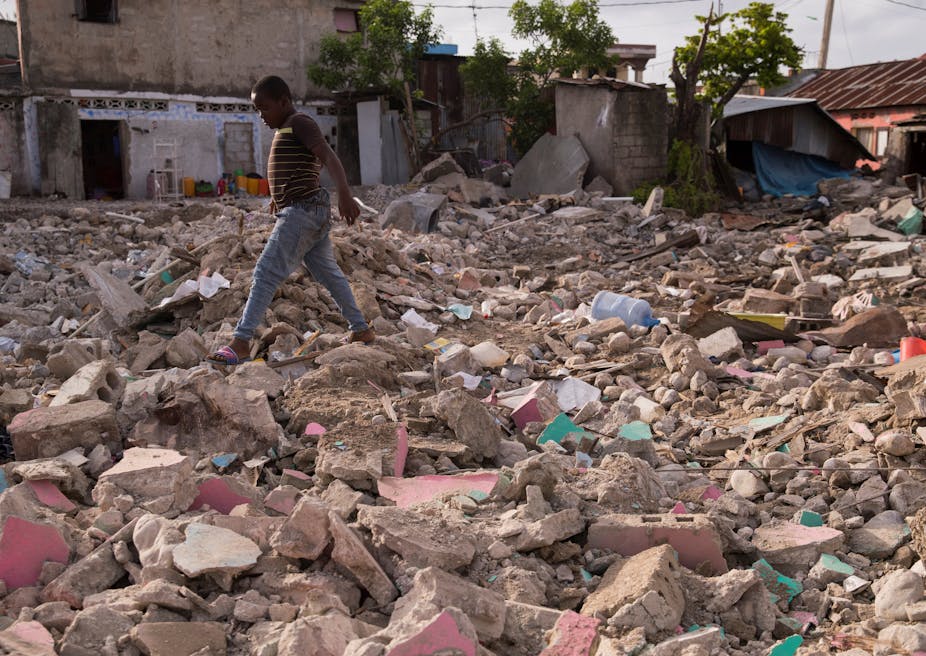From earthquakes to hurricanes, disease and drug violence, the Caribbean island of Haiti has faced a decade of cascading crises. In this week’s episode of The Conversation Weekly podcast we talk to experts about what Haiti’s history tells us about its political fragility and what that means for the country’s ability to recover from disasters. And we talk to a historian about her new research chronicling the experiences of Japanese Americans interned by the US government during the second world war.
The death toll from the huge 7.2 magnitude earthquake that struck the south-western coast of Haiti on August 14 now stands at more than 2,200 people. Around 130,000 homes were also damaged or destroyed. As Louise Comfort, professor of public and international affairs at the University of Pittsburgh, explains, it’s been “extremely difficult” to get aid to people in the worst affected areas, although the situation is now improving.
Comfort uses the term “cascading crises” to describe the situation Haiti has been left in following a devastating 2010 earthquake that killed about 220,000 people and left much of the capital, Port-au-Prince, in ruins. This included difficulty managing the foreign aid that flowed into the country, problems with drug cartels and a deadly cholera epidemic introduced by UN peacekeepers. “You have a weak governance structure that needs support from the outside,” Comfort says. “But when it’s not able to cope with the series of disasters, each time there’s a disaster it weakens some other part of the system.”
The August 2021 earthquake struck as Haiti reeled from the assassination of its president, Jovenel Moïse, in early July. The assassination is the latest crisis in Haiti’s long and turbulent political history, which has often been influenced by foreign interference, according to Jean Eddy Saint Paul, a professor of sociology at Brooklyn College of the City University of New York. He gives us a brief history of Haiti since the country won independence from French colonial rule in 1804 following a bloody revolution.
From French debt imposed on Haiti to compensate the loss of land and enslaved people, to US occupation in the early 20th century, Saint Paul says: “The international community have been always negative external forces that have shaped the political leadership in Haiti.” But Saint Paul also laments that part of the reason for Haiti’s weak democracy is the weakness of its political elites.
Our second story (at 27m40s) looks back at a dark moment in US history: the internment of around 120,000 people of Japanese ancestry during the second world war after the attack on Pearl Harbour in 1941. Susan Kamei, a lecturer in history at the University of Southern California Dornsife College of Letters, Arts and Sciences, talks to us about her new book that chronicles the experiences of those who lived in the prison camps, including both her parents. Kamei tells us that Japanese Americans at the time didn’t have any effective allies and they “lacked the political clout to have a voice to change the narrative and to push against this overwhelming discrimination and prejudice”.
Read more: How memories of Japanese American imprisonment during WWII guided the US response to 9/11
And Kalpana Jain, a senior religion and ethics editor at The Conversation in the US, recommends some reading from our coverage marking the 20th anniversary of the 9/11 attacks. (at 41m)
This episode of The Conversation Weekly was produced by Mend Mariwany and Gemma Ware, with sound design by Eloise Stevens. Our theme music is by Neeta Sarl. You can find us on Twitter @TC_Audio, on Instagram at theconversationdotcom or via email on podcast@theconversation.com. You can also sign up to The Conversation’s free daily email here.
News clips in this episode are from DW News, WION News, Al Jazeera English, PBS NewsHour, CNN, ABC News (Australia), AP Archive, Ayiti branche, Arirang News, Television Jamaica and CNBC Television.
You can listen to The Conversation Weekly via any of the apps listed above, download it directly via our RSS feed, or find out how else to listen here.

